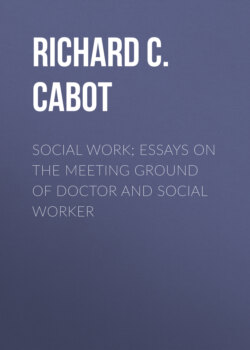Читать книгу Social Work; Essays on the Meeting Ground of Doctor and Social Worker - Richard C. Cabot - Страница 6
На сайте Литреса книга снята с продажи.
II
ОглавлениеTable of Contents
But in the evolution of the particular type of social worker who is the subject of this book, the home visitor connected with a dispensary, there are other forces besides those described above, other motives besides that common to the rise of all the types of home visitors in all the other institutions named. For in the dispensary, not only has the number of applicants greatly increased, but it has increased because people realized that there was much more to be obtained by going to a dispensary than was formerly the case. The development of medical science and of the resources of diagnosis and treatment which can now be put at the service of the dispensary patient, has served to attract more patients there. But these new resources have also complicated the work of the physician in a dispensary, and made it more difficult for him to remember each patient and all the details about each patient as the physical, chemical, psychological, biological facts emerge in the complex ramifications of modern diagnosis and treatment.
In the old days the dispensary, as its name suggests, was a place to dispense, to give out medicine in bottles or boxes. The patient mentioned the name of his ailment, the corresponding remedy was given. It was a quick and simple business—no individual study, no prolonged labor was necessary. Moreover, one dealt only with a clearly defined class, the poor. There was no danger that the numbers applying for relief would swamp the institution or make it impossible for the dispenser to do his work properly.
But within the past quarter of a century the dispensary, especially in the United States, has received a new idea, an access of fresh life. Largely because it has become associated with universities and been used as an instrument of medical teaching, the influence of scientific medicine has begun to be felt there. This influence has enlarged and remodelled the dispensary in two respects. First it has compelled the introduction of modern accurate methods of diagnosis, instruments of precision, time-consuming processes of examination, specialization of labor, and subdivision of function, for the skilful application of these methods. The dispensary physician is no longer content to treat a headache or a cough as an entity, to dispense this or that drug as the remedy for such a symptom. He must discover if possible the underlying disease, and, moreover, the individual constitution and life-history in the course of which the patient's complaint now rises for the moment to the surface like a fleck of white foam on an ocean wave. But how is the physician to gain this radical and detailed knowledge of his patient's life outside the dispensary and enveloping the particular complaints for which he now demands relief?
His difficulties are only increased when diagnosis is complete and he turns to the labors of treatment. For with the advance of modern medical science there are left now but few physicians who believe that disease can often be cured by a drug. It is recognized by the better element of the medical profession all over the world that only in seven or eight out of about one hundred and fifty diseases clearly distinguished in our textbooks of medicine, have we a drug with any genuine pretensions to cure. What is to take the place of drugs in dispensary treatment? In hospital patients we have the hospital régime, the unrivalled therapeutic values of rest in bed, the services of the nurses; but in dispensary practice all this is impossible. What is to take its place?
For a good many years this question remained unanswered in American dispensaries, and as a result thereof there developed the pernicious habit of giving drugs no longer believed in by the physician, the custom of giving what we call placebos, remedies known to be without any genuine effect upon the disease, but believed to be justified because the patient must be given something and because we know not what else to do or how else to satisfy him.
